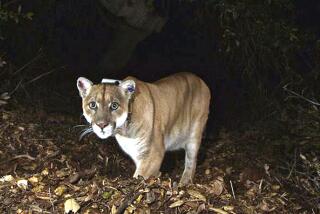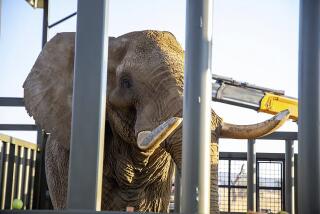Trainer Tells of Killer Elephant’s History of Trouble, Bad Attitude
- Share via
SANTA CLARITA — Even as a youngster, Tyke the elephant was a troublemaker, according to her former trainer.
The 21-year-old African elephant killed a circus trainer last Saturday when she went wild during a performance of Circus International in Honolulu. Tyke then charged out of the arena and roamed through city streets for 30 minutes before police trapped and killed her.
News of the rampage came as little surprise to Brian McMillan, 44, a Santa Clarita animal trainer who worked with Tyke about 15 years ago, when the young elephant was just over five feet tall. McMillan said he spent about three months trying to get her to perform tricks for a nightclub act, for the same owner she has now, before realizing she wasn’t suitable for training.
“She would resist the training,” he said. “She would run away when you tried to do anything with her. She just didn’t have a good attitude.”
McMillan, who still trains a variety of large animals at his rural home, said he has worked with elephants since he was 15 and has found most of them to be cooperative. But he has also seen others with Tyke’s attitude and “eventually they become dangerous.”
Tyke was owned by Hawthorne Corp., an Illinois-based company whose officials have previously stated the animal was spooked when apprentice groomer William Beckworth, 20, walked too close behind her.
Attempts to reach officials Friday at Hawthorne’s headquarters in Grayslake, Ill., were unsuccessful. An employee at the company’s facility in Richmond, Ill., declined to comment.
Beckworth was thrown down by the elephant and veteran trainer Allen Campbell, 37, was crushed to death when he tried to prevent the elephant from stomping on Beckworth’s head.
“I think the thing that shocked me the most was when I saw the trainer step in front of the elephant,” McMillan said. “I knew he was obviously trying to save (the) other guy’s life, but on the other hand, that’s the last thing you do in that situation.”
It would have been better to approach Tyke from the side and then move toward her front to ward off the attack, McMillan said.
McMillan said Tyke’s behavior was not typical for an elephant that had been spooked.
“When an elephant gets spooked they normally try to get away,” he said. “That elephant didn’t want to get away. That elephant wanted blood.”
Beckworth was hospitalized and is recovering from his injuries. In addition, about a dozen people inside the arena were treated for injuries sustained while fleeing the arena.
Those investigating the incident said Tyke was known as a troublesome animal among trainers and she had previous outbursts on multiple occasions.
Last year she broke the ribs of a trainer in North Dakota, said Mike Burgwin, chief investigator for the Hawaiian Humane Society. In another incident, also last year, it took trainers in Pennsylvania an hour to coax her back through a door she “enlarged considerably” by smashing through just before a performance.
The U.S. Dept. of Agriculture is investigating the death to determine if Hawthorne met government animal-care standards, said Cynthia Eck, a department spokeswoman. Investigators have heard about three or four incidents involving Tyke, “but we cannot verify them at this time,” she said.
The preliminary investigation indicates Tyke had sufficient food, shelter and other care, officials said. She also had no diseases likely to trigger the rampage.
But McMillan said that, based on his experience, her care is not an issue. It was not safe, he said, for her to perform in public.
“I personally wouldn’t work with an elephant of that kind of nature because I’d consider it too dangerous,” he said.
More to Read
Sign up for Essential California
The most important California stories and recommendations in your inbox every morning.
You may occasionally receive promotional content from the Los Angeles Times.










